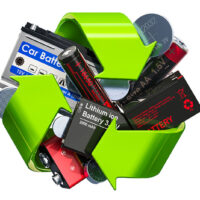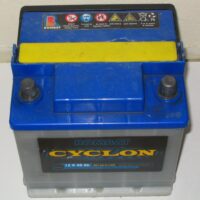Leading the Charge for a Sustainable Tomorrow

Alessandro Volta
Batteries work on positive and negatives, much like our daily lives work on batteries. Today is National Battery Day, and while the origins are not definitively known, February 18th commemorates the birth of Alessandro Volta, the “father” of the battery. Volta invented the first “true battery” in 1800 using copper and zinc separated by a salt water soaked cloth. Batteries convert chemical energy to electrical energy and Volta’s research indicates that he first used the term “volt” to describe electric potential. Flash forward over 200 years and batteries are integral to our daily lives. From powering flashlights to cell phones, medical devices, and beyond, it’s hard to imagine a day without batteries.

Photo credit: City of San Diego
While the benefits and convenience of batteries are well known, their production and after life can have negative consequences. Batteries are made with precious metals that are mined from many countries often under poor working conditions. Mining is expensive, with many social and environmental impacts. As the demand for batteries increase mining becomes more politically charged. Knowing the proper way to dispose of a battery can help recover some of these metals, reduce the impacts of mining and prevent hazardous materials from entering nearby ecosystems.
So your battery is out of charge, and you’re asking can I throw my battery out? That depends on the kind of battery. Let’s explore the different kinds of batteries and the best practices for disposal. In NYC, DSNY Household Waste Drop-Off Sites accept all batteries, however they are on pause through June 30, 2021.
Single Use Batteries

Alkaline Batteries Image: Department of Sanitation New York
Single use batteries are typically alkaline or button cell. Alkaline batteries are safe to dispose of in household waste because they no longer contain dangerous metals. For almost 200 years, mercury was used to reduce corrosion in batteries. With the passage of the Mercury-Containing and Rechargeable Battery Management Act of 1996, alkaline batteries are no longer made with mercury and so can safely be disposed with household garbage. However, mercury is still used in button cell batteries, the batteries that resemble silver coins. While different municipalities have different regulations on how to dispose of button cell batteries, the mercury in them can enter the environment via incineration or leakage from landfills, and so button cell batteries should be recycled. Learn more about recycling single use batteries here.
Rechargeable Batteries
Rechargeable batteries are made with a variety of heavy metals and cannot be discarded in household trash. Like the mercury in button cell batteries, improperly disposed rechargeable batteries can have a negative impact on the environment. Lithium-ion batteries are some of the most common rechargeable batteries and are used in cell phones and portable electronics. These batteries can be returned to any store that sells them. The NY State Rechargeable Battery Law mandates businesses that sell rechargeable batteries to collect them, at no charge to the consumer. Retailers that collect rechargeable batteries include, Best Buy, Staples and drug store chains. Other common rechargeable batteries include auto batteries, which contain copper, nickel, lead, and lithium. Auto batteries should be returned to auto supply stores or service stations.
- Auto Battery
- Cell Phones with Lithium Ion Batteries
Leading the Charge for a sustainable tomorrow
As our dependency on batteries and our desire for sustainable energy grows, there are a few ways to change how we charge for the better. The easiest change is to properly dispose of your batteries. The demand for lithium and cobalt is rising and in anticipation of meeting that demand, major tech producers are developing recycling programs. In addition, we can reduce our daily energy consumption. Small changes, like turning cell phone airplane mode off for an hour a day, can extend the life of our batteries. Adjusting our consumer habits, by buying rechargeable batteries or holding on to an older phone model, when possible, can reduce demand for mined metals and the accompanying pollution tied to battery production. Finally, if consumers increase requests for transparency about supply chains and environmental impacts, companies may be motivated to be more environmentally mindful going forward.

Freshkills Park, site of the former Fresh Kills Landfill
Explore e-waste and energy demand further
The 411 on Cell Phone Sustainability: Cell phone batteries are not disposable
Ethics of e-waste: What to do when your rechargeable device is not up to date
From Scream to Clean: Revisit Monster’s Inc and the evolution of electricity






